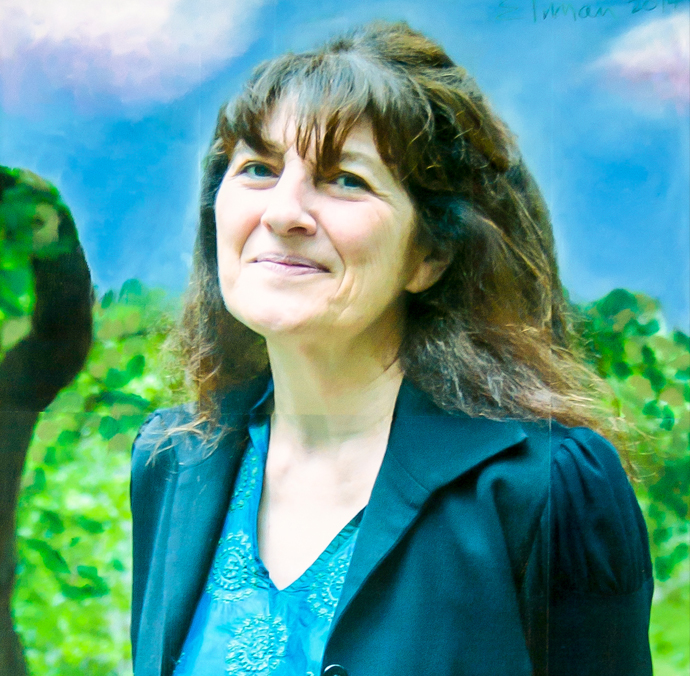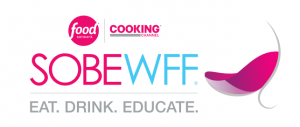Gastronomically Speaking: A Conversation with Ruth Reichl


Raymond Elman: A Walk in the Park, 2014. Oil & digital collage on canvas. 30 x 40 inches. [courtesy Williams McCall Gallery, Miami Beach]
Although Ruth Reichl’s reputation in the food world grew out of her innovative approach to restaurant criticism (when she was the restaurant critic of the New York Times she would dine out in elaborate, often dowdy, disguises to avoid preferential treatment and document a restaurant’s attitude toward the non-chic), it is the high quality of her memoirs that may be her most significant accomplishment. Tender at the Bone: Growing Up at the Table (1998), Comfort Me with Apples: More Adventures at the Table (2001), Garlic and Sapphires: The Secret Life of a Critic in Disguise (2005), and Not Becoming My Mother: And Other Things She Taught Me Along the Way (2009)—which was later published as For You, Mom. Finally. (2010)—are all engaging, poignant, funny, and informative.
Lee Skye: Your memoir style is so accessible and clear. We were wondering if you’ve applied your skills to other forms of writing besides memoirs, cookbooks, and journalism.
Ruth Reichl: I’m finishing a novel now, a totally different form for me, and I find it really wonderful not to be constrained by the truth. I have no idea if it is any good or not. I’m hoping to finish the first draft in the next couple of weeks.
LS: You once wrote that “the truth shouldn’t get in the way of a good story.” I’ve always been told that a memoir is what you remember. It’s not a biography, and it doesn’t have to be 100 percent accurate.
RR: I come out of journalism, and it was shocking to me that there were things I didn’t remember, where I was embroidering what I thought was true, but I wasn’t sure It bothered me a lot that there were facts I couldn’t check. I was also kind of shocked by the fact that no one at Random House, who was my publisher then, seemed to care about it. My editor said, very wisely, “Come on, you’re talking about things that happened fifty years ago and you were a little girl. How could you possibly remember verbatim conversations from the time you were eight? Of course you are going to have to reconstruct it to the best of your ability.” This is foreign to journalism, where you check every fact. None of my books are biographies. They all are memoirs. They are about finding the truth, even though a particular story may not be literally accurate.
With the first draft of my memoir Tender at the Bone, I didn’t want to talk about my mother’s mental illness, so I made her into a kind of Auntie Mame character. My editor, Ann Godoff, said, “There’s something not right here. I feel like you are hiding something.” I said, “Well, you know, my mother was a classic bipolar person, and I really don’t want to get into that.” But Ann said, “You either have to completely get rid of her eccentricity, or you have to talk about it. It doesn’t ring true that she’s a funny eccentric all the time.” So I took a deep breath and decided that I was going to tell the truth about my mother. That’s a really hard thing when you’re dealing with embarrassing events. She was no longer alive when I wrote my first memoir, but I knew that she would be deeply embarrassed by all the revelations. That’s partly why I wrote my most recent book, For You, Mom. Finally, because I really felt I owed it to her to tell her side of the story.
LS: I thought the title was Not Becoming My Mother.
RR: That was the title my editor insisted on, not the title I wanted. I was settling my debt to my mother and, in the course of doing that, discovering all kinds of amazing truths that I had not known about her. Tender at the Bone is my truth about my mother and For You, Mom. Finally. is her truth. It is very much in her words. I had the good fortune to find a trove of her letters and other documents after many years of looking for them.
LS: So many people must feel like they know you because of your four memoirs. What are some of the positive and negative experiences you’ve had when fans approach you?
RR: I haven’t had any negative experiences. The only negative side is that sometimes I feel like I’m such a disappointment to people. People build an idea of you from reading your memoir, and then you’re just you. I often have this feeling that people want me to be smarter, wiser, etc., than I really am.
LS: The last time we looked you had 88,589 Twitter followers.
RR: I love Twitter. I found a voice there that I didn’t know I had. The discipline of 140 characters makes you compress words into a snapshot. It’s also a good forum for people who watch me judge the TV show Top Chef Masters. My husband says I was born with too much serotonin, and I’m starting to feel it myself. I watch myself on Top Chef Masters, and God, I smile a lot. When I first assumed the job at the New York Times, one of the restaurants sent around a memo that read, “She has a lot of curly brown hair and smiles a lot.” When I watch myself on Top Chef Masters, then read my Tweets, I realize that I really am one of those people who manage to find a way to take pleasure in very small things.
LS: I think your humor and happy demeanor shine through in your books, no matter what situation is being described. In your memoirs, you make references to diaries and journals that you kept. When did you start keeping a journal or a diary?
RR: When I was about eight. The place where my diaries were most useful was the boarding school in Montreal. I was surrounded by French, a language I didn’t understand, and I pretty much immersed myself in my diary. For the first three months I just wrote and wrote and wrote and wrote and I had these tear-stained diaries, and they were really helpful. Also, I’m a pack rat. I have every letter I ever got when I went to camp. All the mail I received when I was in college. I have boxes of stuff. When I was working on stories for New West magazine, whenever I finished an article I would sweep everything that was on my desk into a folder and put it away. When I open these folders years later, they are almost like time capsules. There are notes about telephone calls, menus, scribbles—whatever happened to be on my desk when the story was done just went into the folder. So, opening the folders now is in many ways more than a diary. It’s almost like I inhale the time. I’m planning to write about the Gourmet magazine years. For all the time that I was at Gourmet I would print out two or three e-mails every day just to have an idea of what was going on. In about year six, I came back from Christmas vacation and my secretary said very proudly, “I cleaned out all that junk in your desk.” She had thrown it all away.
LS: Your time capsules sound like a great resource for you.
RR: They are a great resource. I am a big believer that you need more than just the words, because you never know what’s going to be important. I come by this very honestly. My mother did exactly the same thing, and it was really useful when I wrote her story. There were drafts of letters to her psychiatrist. It was not the kind of stuff I expected to find.
LS: That must have been tough reading.
RR: If I could kill this man retroactively I would. (Laughter)
LS: In your memoirs, you describe teenage years when you felt pudgy and unattractive. Did you go through internal battles about body image?
RR: I went on every diet known to teenagers. People said to me over and over again, “You’d be so pretty if you’d lose some weight.” I wasn’t obese, but I was about thirty pounds heavier than I am now. I would not eat all day, then gobble up everything in sight at night.
LS: Do you think that the 24/7 broadcast of TV food shows contributes to the current obesity epidemic?
RR: No, I really don’t. I have a whole speech that I give about how disconnected we’ve become from food. The less we cook, the more we watch food shows about cooking. Our connection to food sources should be more important to us. I truly believe the obesity crisis is about the industrialization of food. We produce 1,500 calories per capita more than we can eat, and our entire tax structure is about making us consume those extra calories. It’s why supersized eighty-four ounces of Coca Cola is practically free. It’s why fast-food hamburgers are cheaper than vegetables. I think this obesity crisis has nothing to do with our love for food, and everything to do with our tax policy. Huge manufacturers have been allowed to market to children.
LS: Is that why we don’t have wholesome menus in schools and hospitals?
RR: We don’t have wholesome menus in schools because the school food program is seen as a way of using up surplus food. It’s not seen as a way of feeding and nourishing children. That is starting to change, but for years it has just been a way to get rid of surplus commodities. It’s ridiculous when they get away with classifying ketchup as a vegetable. Ketchup is essentially sugar. Hospitals have a whole other set of problems related to the way we have taught nutrition in this country: that if they give you enough fortified vitamins it somehow gets metabolized the same way as a healthy diet—which I don’t believe. I think if you eat a fresh peach off a tree what you get from it is very different than if you take a vitamin pill. We are increasingly discovering that we metabolize food quite differently depending on how it is presented to our bodies.
LS: What we saw of Jamie Oliver’s TV show—Jamie Oliver’s Food Revolution—addressing school menus and children’s food knowledge, was brilliant. Are local noncelebrity chefs involved with this issue?
RR: They are. Mrs. Obama had five hundred chefs to Washington and made them each pledge to adopt a school. There is hardly a chef in this country who isn’t dealing with school food in some way. A lot of it goes under the radar, but any chef who has a kid in school is in there trying to figure out new ways to address school food issues. Alice Waters has a whole new program, and there are dozens and dozens of them in every state.
LS: What are your thoughts regarding the science of cooking movement?
RR: Most people are still cooking the way the caveman cooked. We throw a piece of protein on a fire in a time when we’re sending rockets into space. We should be deconstructing and thinking about the science of cooking. Nathan Myhrvold, who has just put out a six-volume set on modernist cuisine, is a fascinating guy, a kind of a genius. The book doesn’t just talk about cooking with centrifuges and so forth, it also looks at what takes place inside a piece of meat when you roast it. How a wok works. For instance, they cut a wok in half and measured where the wok is hottest during cooking. It turns out the most heat is a few inches above the wok. So now, you suddenly understand that instinctively Chinese chefs have been pulling the food up. They’ve been doing it because up in the air is where it is the hottest.
LS: One person who did strange things in the kitchen and in your life was your mother. It seems like she pushed you to do quite a few things in your younger years that made you unhappy at the time (like sending you to a French-speaking boarding school in Montreal), which later contributed to your success. How do you view some of her hurtful actions in retrospect?
RR: The real reason they sent me to Montreal was because she just couldn’t handle having me at home, and she was about to have a nervous breakdown. Was it worth it? I don’t think so. I feel like it totally changed me and made me really unhappy for the next six or seven years. I feel like the price was too high. It’s nice to be able to speak French. It was certainly a great introduction to another culture. It was a fabulous way to learn about food. But it’s one thing to send your child to boarding school. It’s another thing to send a little Jewish kid from New York to a Catholic school in a language she doesn’t understand, in the middle of the school year. My parents took a fairly happy child and made me really unhappy until I sort of found myself again when I met Doug Hollis, whom I later married.
LS: During your tenure at the New York Times, you created disguises to maintain anonymity when you went to restaurants. Is there a particular character that you enjoyed playing? Have you ever considered acting?
RR: No. I’m not an actor. I know that. The thing I discovered in doing the disguises was that there was a piece of me in all of those people. It was just another facet of my own personality. The one I liked best was Brenda. Unfortunately, everybody else liked her better than me, too. She really was the ultimate Pollyanna. She never minded standing in line. She smiled at everyone. She never had a bad day. She was open and generous and able to talk to strangers. She was the person I wish I could be all the time.
LS: What else are you up to these days?
RR: I’m working on so many interesting things. When Gourmet went away I thought, “Oh, life is over,” but it’s been such an amazing time. I’m working on a novel and a cookbook and the next memoir. I’m an editor at large at Random House, which basically means I am looking for projects for them. I am doing Top Chef Masters. I just signed on as the editorial advisor to an online food magazine. I think it’s going to be the magazine of my dreams. . It’s called Gilt Group, which is a commerce site, and we are launching something called Gilt Taste. We’re selling artisanal food products, and we’re surrounding it with editorial. So it’s an online magazine that’s not based on advertising. Everybody is lamenting the end of traditional journalism, but I think we should be celebrating the beginning of all these new possibilities.
***
Editor’s Note: A different version of this interview was published in Provincetown Arts magazine in 2011. rse


